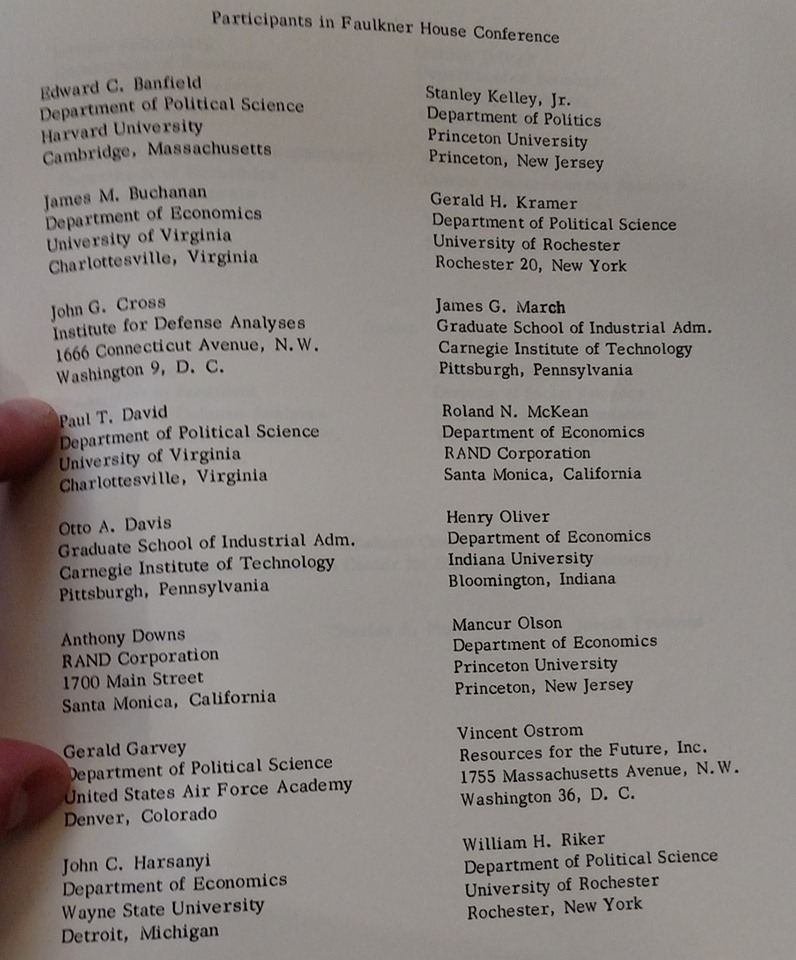Did James M. Buchanan ideologically exclude scholars who sat to the political left of him from the “public choice circle” in the formative years of the subfield? That’s the claim in an older post by Brad DeLong, which sparked a renewed discussion and subsequent commentary from him over the weekend.
DeLong’s post consists of a 6-part commentary on how he processes Buchanan’s career. Although he credits the co-author of the Calculus of Consent as a brilliant thinker in the first part, the remaining points are critical. Numbers 2, 4, and 6 are basically credulous repetition of debunked claims by Nancy MacLean in Democracy in Chains, and point 5 is DeLong’s own normative griping, so I won’t focus upon them. But the 3rd comment introduced an original complaint against Buchanan, depicting him as an
“academic operator going beyond what I, at least, regard as the permissible academic pale by imposing a political-ideological litmus test on who he invited into the public choice circle—i.e., not Mancur Olson, or any Olson students or potential Olson students (like me, in my younger days).”
The complaint struck me as odd as the late Mancur Olson, a brilliant economist who spent much of his career at the University of Maryland, was very much a part of the intellectual community that Buchanan had cultivated over the years. I immediately recalled hearing in grad school how Olson had driven across the Potomac to attend a public choice seminar at George Mason University only a week or so before he unexpectedly died in 1998. His works are still taught as a foundational core of the public choice track at GMU, and multiple Olsonians still teach in the department.
So I went back and looked at the evidence to see if Mancur Olson was in fact a victim of a “political-ideological litmus test” that kept him out of the “public choice circle” around Buchanan. It turns out there’s absolutely no basis to this claim.
The founding of the Public Choice Society is an obvious starting place for our investigation. Buchanan served as its first president in 1964 after organizing the society with Gordon Tullock at the University of Virginia’s Thomas Jefferson Center (TJC) for political economy. Olson was a welcome participant in the group and served as the society’s 6th president from 1972 to 1974. But he was also deeply involved in its founding.
The society actually traces its origins to an event now known as the Faulkner House Conference – a gathering of about 20 economists and political scientists in October of 1963 that Buchanan and Tullock hosted at UVA. The conference laid the groundwork for what became the public choice subfield and effectively launched a recurring conference that became the society and publisher of the journal by the same name. I just so happened to be working on archival materials from this event, including a participant list. It included numerous intellectual luminaries, among them future Nobel laureate John Harsanyi was there, as were William Riker, Anthony Downs, and Vincent Ostrom. Political theorist John Rawls also attended, as did several PhD students from UVA who went on to become contributors to public choice theory in their own right. Also notably present was Mancur Olson, only a few months past his PhD defense at the time and serving in his first semester on the faculty at Princeton.

So Olson was there from the very beginning. That seems like a very strange way to impose a “political-ideological litmus test” that excludes a person from the “public choice circle” around Buchanan.
But aside from his participation, what did the TJC crowd think of Olson personally? It turns out that they held him in high esteem. We can ascertain that much from Gordon Tullock, who actually served as an academic reference for Olson when the latter was applying for faculty jobs at another university (he moved to Maryland in 1969).
Now Tullock was famously acerbic, and even derisive of scholars who he ranked beneath his own intellectual ability. Yet in turning to his assessment of Olson one finds only immense charity and respect. Here is the passage from Tullock’s 1969 reference letter, which incidentally was for a faculty position at DeLong’s own current university, UC-Berkeley:
“In response to your letter of October 7, I can recomment Mancur Olson extremely highly. He has an original and inventive mind and has applied it in the past to very interesting work. There is every reason to believe that he will continue to make such interesting applications in the future. Personally I am sure that you will find him a very pleasant and cooperative person to work with.”
Source: Gordon Tullock Papers, Hoover Institution
So to review, far from being ideologically excluded from the “public choice circle” by Buchanan and the rest of the TJC, Olson actually enjoyed their enthusiastic support from the earliest days of the Public Choice Society and even turned to Tullock when he needed a more senior scholar’s reference to advance his own career.
DeLong’s grievance, it would seem, is specious nonsense.